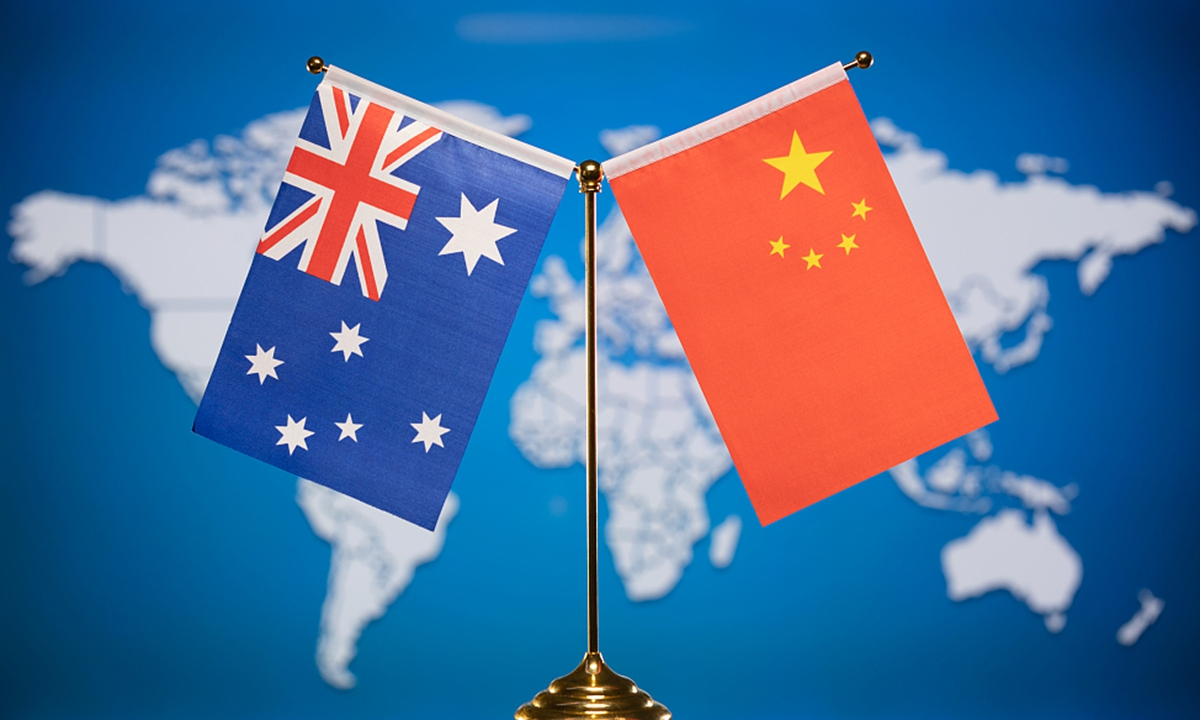
China Australia Photo: VCG
Only one day after alleging that "China's military build-ups" would cause inevitable upgrade of military capabilities of its neighbors in his speech at the 19th Shangri-La Dialogue in Singapore, Australia's Deputy Prime Minister and Minister of Defense Richard Marles met on Sunday with China's State Councilor and Defense Minister Wei Fenghe who is also attending the event, a first time for three years, which Australian local media hailed as a sign of breaking a two-year diplomatic stalemate between the two countries and marking a first step toward improved bilateral relations.
However, Chinese observers expressed caution, saying the meeting shows Beijing's expectations to restore ties with Canberra especially after new Australian Prime Minister Anthony Albanese took office, while pointing out that Canberra is still living in the shadow of the former Morrison government where it continues to embroil itself in an unnecessary arms race, posing China as its imaginary enemy, and serves as a vanguard of the US against China in the region, and that would still complicate the relationship.
Their meeting marked the first high-level contact between the two countries since January 2020, the Australian Broadcasting Corporation said.
The Chinese Department of National Defense had not announced details of their meeting as of press time.
Before their Sunday meeting, Marles, however, in his speech at the Shangri-La Dialogue, mentioned China for over twenty times.
While admitting that "Australia values a productive relationship with China," and China remains our largest trading partner," Marles claimed that "it is critical that China's neighbors do not see this build-up as a risk for them. Because without that reassurance, it is inevitable that countries will seek to upgrade their own military capabilities in response."
Marles said that "Insecurity is what drives an arms race," which Chinese observers believed it is an excuse for its role to serve as vanguard for the US in Washington's so-called Indo-Pacific strategy that is essentially targeted against China, which would eventually harm Australia's own interests.
Australia is heavily dependent on China economically, but it acts as a vanguard of the US against China in its foreign policy and regional security issues, the main reason why China-Australia relations are complicated, Chen Hong, director of the Australian Studies Centre at East China Normal University, told Global Times on Sunday.
Australia's high-profile announcement that it would build at least eight nuclear-powered submarines with the help of the US and the UK is seen as an important way for the US to expand its "integrated deterrence" by beefing up Australia's military power and further offset China's growing regional influence.
Australia is embroiling itself in an unnecessary arms race, picturing China as its imaginary enemy which is fundamentally undermining its own interests, and the Australian government should reflect on its unprincipled role as the vanguard of the US' anti-China campaign and have a sober and rational understanding of China, Chen noted.
Besides, Australia's series of moves including elevating its defense budgets and increasing military investment in patrols in South China Sea and other regions around China, are all for the interests of the US and against the interests of Australia, Song Zhongping, a military expert and TV commentator, told the Global Times on Sunday.
It would be wise if it gives up anti-China groupings and alliances such as the AUKUS, if it intends to repair ties with China, Song noted.
Marles told a press conference Sunday that the meeting was a "frank and full exchange" in which he raised a number of issues of concern to Australia, including China's recent interception of an Australian air force plane over the South China Sea, according to reports.
Australia's Defense Ministry unilaterally claimed that an Australian military aircraft was intercepted by a Chinese military aircraft while conducting a reconnaissance mission over the South China Sea on May 26, endangering the safety of the Australian aircraft and its crew.
In response, China's Ministry of National Defense said in response that the PLA Southern Theater Command organized maritime and aerial forces to identify and warn away an Australian P-8A ASW aircraft, when it repeatedly approached the Chinese airspace of the Xisha Islands for close-in reconnaissance on May 26 despite repeated warning from the Chinese forces.
The latest meeting reflects expectations for improved bilateral relations after Albanese took office and it is hoped that bilateral relations will develop in a positive direction, the expert added.
Canberra should deeply understand that it is in line with their national interests to develop normal relations with China, and that the new Albanese government would cease following the wrong path of the former Morrison government to undermine the bilateral ties and cause harm to the country's interests, Song noted.
Not so long ago, Chinese State Councilor and Foreign Minister Wang Yi talked about the prospects of China-Australia relations at a joint press conference with Foreign Minister Soroi Eoe of Papua New Guinea on June 3, when concluding a 10-day visit to the South Pacific.
Wang said the crux of the difficulties in China-Australia relations in recent years lies in the fact that some political forces in Australia are determined to see China as an adversary rather than a partner and portray China's development as a threat rather than an opportunity. This has led to a significant reversal of Australia's previous positive and pragmatic policy toward China.
According to Wang, the solution to the problem is that Australia should view China and its relations with China rationally and positively, respect China and seek common ground while putting aside differences, creating necessary conditions for the two countries' relations to return to the right track.
Wang stressed that there is no "autopilot" mode for China-Australia relations. Concrete actions are needed to reset bilateral ties. This conforms to the aspirations of the two peoples and the trend of the times.




